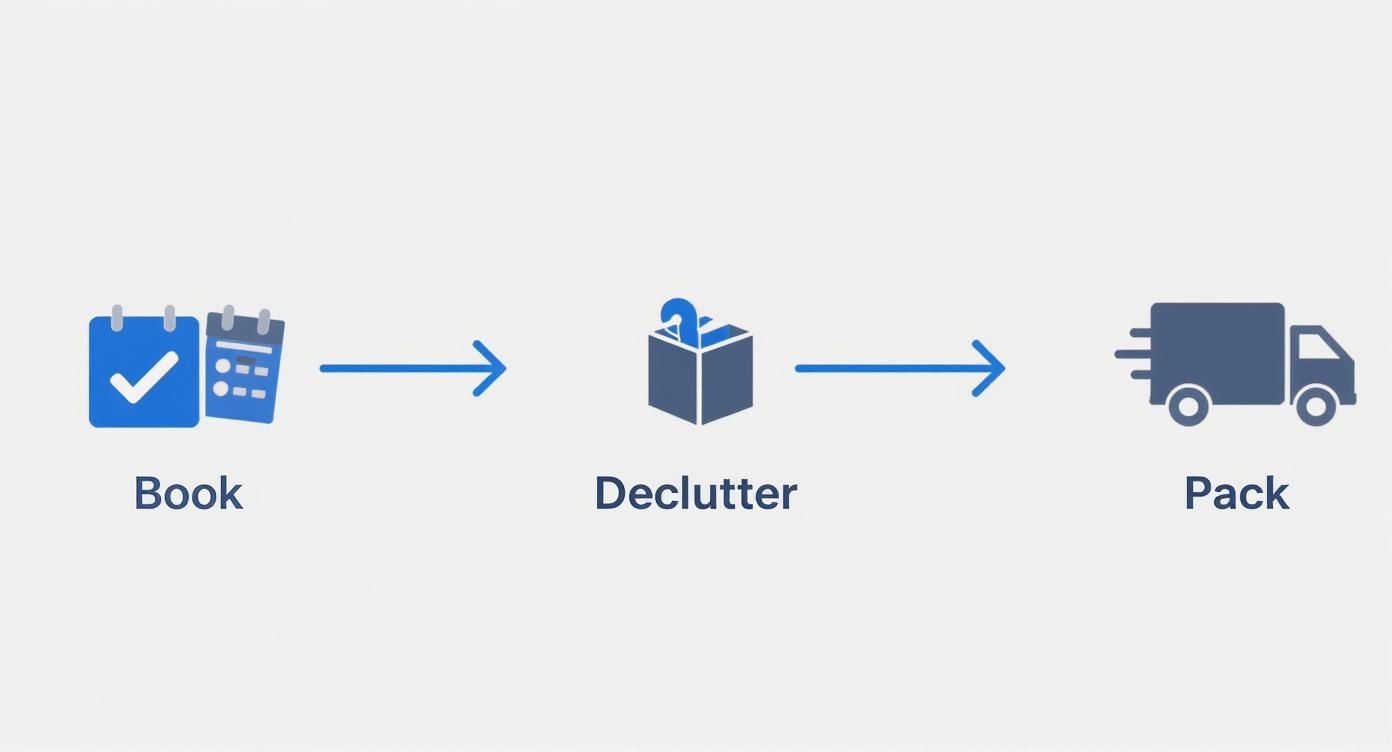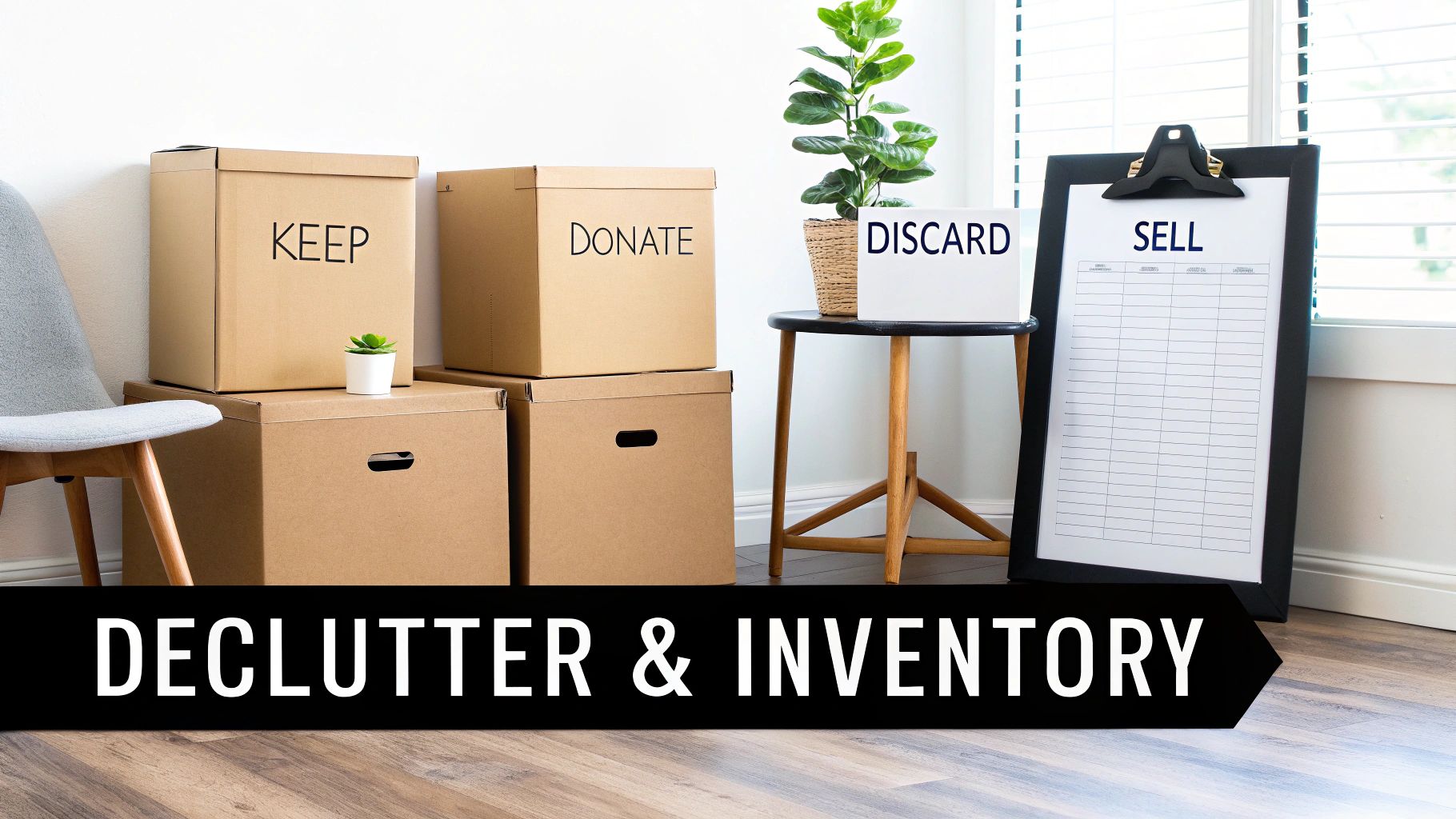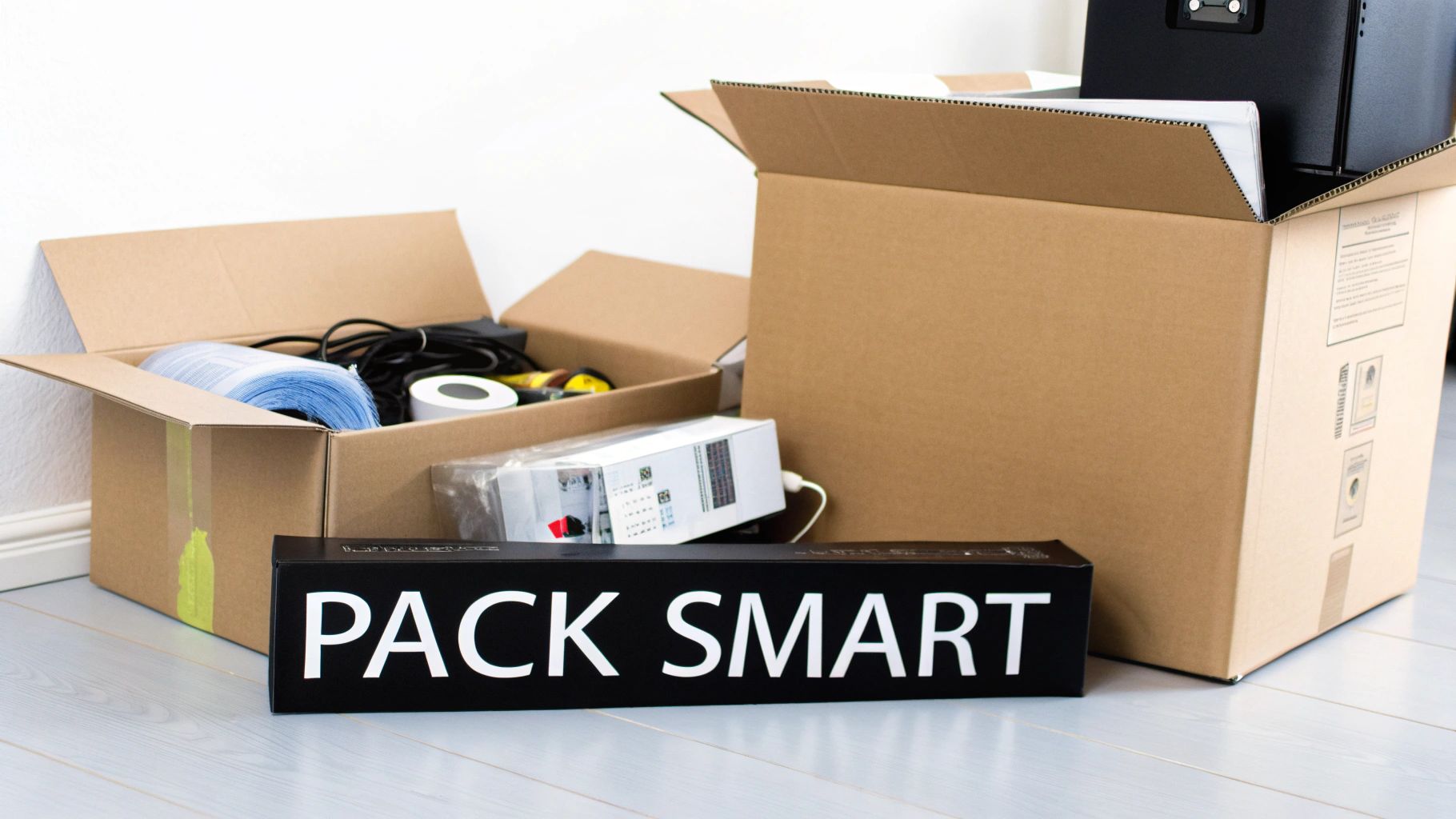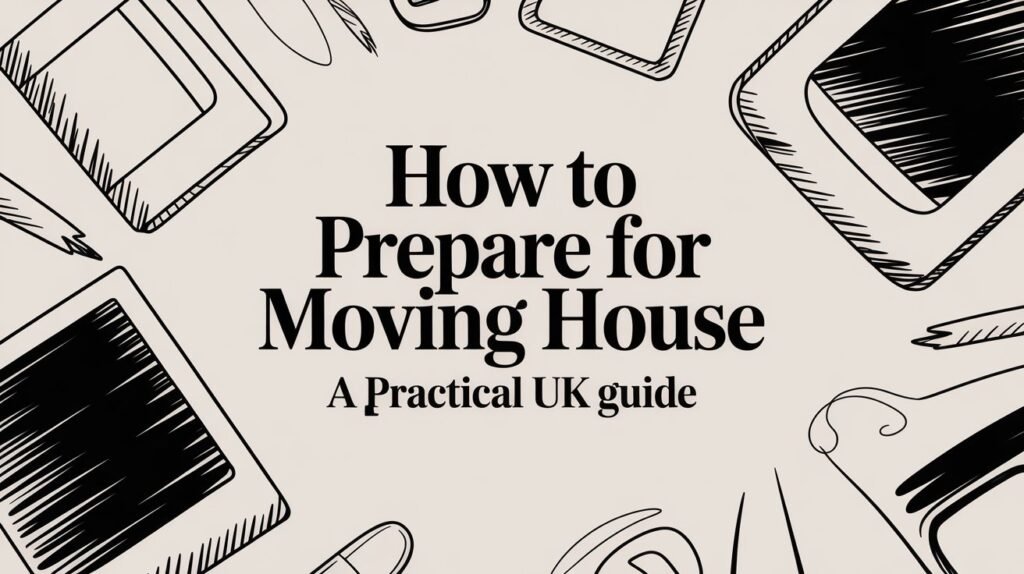The secret to a stress-free move? It’s not about luck; it’s about a solid plan. I always tell my clients to start thinking about the timeline at least 8–12 weeks before your move date. Honestly, it’s the best way to turn a massive, overwhelming job into a series of small, manageable tasks. A good plan will save you from that last-minute panic and make the whole process feel much smoother.
Your Moving Timeline: From Eight Weeks to Moving Day
Let’s be real, moving house is a big project, not just a one-day event. The thought of it can be completely daunting, but the single best piece of advice I can give is to break it all down into a weekly schedule. Kicking things off at least two months ahead gives you breathing room to think clearly and make smart decisions without the clock ticking down.
This early stage is all about laying the groundwork. Your first big decision? Deciding how you'll actually move your stuff. Are you going to hire a professional removal company, or are you brave enough to go the DIY route with a rented van? For most people, especially around the busy streets of Bristol and Bath, bringing in the professionals is a game-changer. Their experience and efficiency are worth their weight in gold.
Securing Your Services Early
Booking your removal company is one job you want to get ticked off the list as soon as possible, especially if you’re moving during a peak season. Did you know that August is consistently the busiest month for moving in the UK? It’s been that way for over a decade. On the busiest days, removal firms can see four times their usual workload. What does that mean for you? Well, 85% of companies report more delays, which is the last thing you need on an already stressful day.
By booking two or three months in advance, you’re not just locking in your preferred date; you'll often get a better price too. It also gives you plenty of time to sort out the details:
- Get Accurate Quotes: Aim for at least three quotes to compare what’s on offer. A quick video survey is a fantastic, hassle-free way to get an accurate price without needing someone to visit your home.
- Check Insurance Coverage: Double-check that the company has proper goods-in-transit insurance to protect your belongings.
- Confirm Services: Get it in writing what the service includes. Will they supply packing materials? Do they handle furniture dismantling? What about specialist items like a piano?
A well-planned timeline is your greatest asset. It converts the abstract challenge of 'moving' into a concrete list of achievable tasks, ensuring nothing critical is overlooked. Acting early removes the single biggest cause of moving-day stress: running out of time.
This infographic gives a great visual overview of the whole process, from those initial bookings right through to the final packing frenzy.

As you can see, getting those early decisions right, like choosing your removal company, has a knock-on effect that makes everything else, like decluttering and packing, much easier.
To help you get started, here’s a quick overview of what you should be focusing on and when.
8-Week Moving Countdown Checklist
| Timeframe | Key Tasks for Homeowners | Key Tasks for Renters | Key Tasks for Businesses |
|---|---|---|---|
| 8 Weeks Out | Confirm completion dates. Research and book your removal company. Start a major declutter (loft, garage, spare room). | Give notice to your landlord. Confirm move-out date. Research and book removals. Start decluttering unwanted items. | Finalise new premises lease/purchase. Book specialist IT and commercial movers. Plan the move with department heads. |
| 6 Weeks Out | Order packing materials. Begin packing non-essential items (e.g., out-of-season clothes, books, decorative items). | Arrange end-of-tenancy cleaning. Start packing non-essentials. Check inventory against your deposit protection scheme. | Inform clients and suppliers of your upcoming move. Order new stationery/update website with new address. |
| 4 Weeks Out | Notify utility companies, banks, and other services of your new address. Arrange mail redirection with Royal Mail. | Update your address with utilities, council tax, and banks. Book professional cleaners. Arrange mail redirection. | Begin packing non-critical files and office equipment. Coordinate with IT for server/network migration. |
| 2 Weeks Out | Dismantle non-essential furniture. Pack an "essentials box" with items for your first night. Confirm details with your mover. | Finish most of your packing. Confirm details with your landlord for the key handover. Pack your "first-night" box. | Finalise the move-day schedule. Distribute move instructions to all staff. Label all equipment and furniture by department. |
| Move Week | Defrost the fridge/freezer. Complete all packing. Keep important documents and valuables with you. | Deep clean the property. Take meter readings and photos of the property's condition. Collect keys for your new place. | Execute final data backups. Final sweep of old premises. Ensure utilities are active at the new location for day one. |
This checklist is a fantastic starting point for mapping out your move and making sure every base is covered.
Building Your Personalised Timeline
Of course, while an eight-week plan is a brilliant framework, every move is different. If you’re a renter, you’ll be focused on arranging an end-of-tenancy clean and getting your deposit back. Homeowners are often juggling unpredictable completion dates. And for businesses, the main challenge is moving without disrupting operations.
The trick is to identify these unique needs early on. For a more in-depth guide, check out our detailed moving countdown checklist to build a plan that’s tailored to your specific situation. This roadmap doesn’t just tell you what to do; it shows you when to do it, putting you firmly in control from start to finish.
Decluttering and Creating a Home Inventory
Right, before you even think about wrestling with a roll of packing tape, the most important part of your move begins. It’s all about deciding what’s actually making the journey with you. This isn’t just a simple tidy-up; it’s a strategic decision that will directly affect how much your move costs and how complicated it gets. Every single item you decide to leave behind is one less thing to pack, shift, and find a home for on the other side.

Let's be honest, the sheer amount of stuff we all accumulate can feel a bit daunting. The key is not to try and conquer the whole house in one go. You’ll just burn out. Instead, break it down. Focus on one room, or even just one corner of a room, like a single wardrobe or a kitchen cupboard. Small wins will keep you motivated.
A Practical Way to Declutter
One of the most effective ways I’ve seen people tackle this is with the "Four-Box Method." It's simple. As you sort through your possessions, every single item goes into one of four piles or boxes. It makes the decision-making process so much clearer.
- Keep: Easy. These are the things you love, use all the time, and can't imagine your new home without.
- Donate: Anything in good nick that you just don't need anymore. Local Bristol and Bath charities are always looking for quality donations, so your old things can get a new lease of life.
- Sell: Got some higher-value bits and pieces you no longer need? Getting them on an online marketplace or taking them to a car boot sale can put a bit of cash back in your pocket to help with moving costs.
- Discard: This is for anything that’s broken, out-of-date, or just plain unusable. Just be sure to recycle whatever you can.
This simple system forces you to make a conscious choice about everything you own. It stops you from accidentally paying to move clutter from your old house into your new one. It's an incredibly freeing process.
Your Home Inventory is Your Secret Weapon
Once you've whittled down your belongings to the "keep" pile, it's time to create a home inventory. This is more than just a list for the insurance company; it’s the blueprint for your entire packing operation. A proper inventory gives you a realistic idea of the sheer scale of the job ahead.
Go through room by room and jot down the main items. You don’t need to count every paperback, but group things logically. For example, "Living Room: 3-seater sofa, armchair, coffee table, TV unit, approx. 50 books, 2 large boxes of ornaments."
A home inventory turns packing from a guessing game into a calculated plan. It helps you figure out how many boxes you’ll need, flags anything that needs specialist handling, and gives your removal company the details they need for a spot-on quote.
This organised approach is becoming the norm. Recent studies show that about one in six UK homeowners are planning a move this year, looking for a better lifestyle or just more room. Interestingly, 40% of buyers are now putting homes with garages or driveways at the top of their list, highlighting that need for practical space. You can explore more about these moving trends to see how your own plans stack up.
Ultimately, taking the time to do a thorough declutter and inventory will save you a surprising amount of time, money, and stress down the line. You’ll pay less for removals, use fewer packing materials, and find that unpacking is a much smoother, more manageable task.
Strategic Packing for an Organised Move
Now that you’ve decluttered and have a good inventory, it's time to tackle the boxes. Let’s be honest, packing isn't just about putting things away; it's a strategic operation. Get it right, and you'll protect your belongings and, more importantly, your sanity. The aim here is to make unpacking at your new place in Bristol or Bath as painless as possible.

Before you dive in, resist the urge to just start throwing things into the nearest box. A bit of prep work will pay off massively later on. Start by gathering your tools. Trust me, you'll need more than you think, so always overestimate.
Your packing toolkit should include:
- Sturdy Boxes: Get a good mix of small, medium, and large sizes. Small ones are a must for heavy things like books, while the big ones are great for lighter, bulkier items like duvets and cushions.
- Strong Packing Tape: This is not the place to cut corners. Decent quality tape stops boxes from bursting open mid-transit.
- Protective Materials: Think bubble wrap, packing paper, or even old towels and bedding. They’re perfect for wrapping fragile items and stuffing into gaps to stop things from rattling around.
- Marker Pens: A few thick, permanent markers are your best friends for labelling.
The Room-by-Room Packing Strategy
The most effective way I’ve seen people handle packing is by going room by room. It’s a methodical approach that stops you from feeling completely overwhelmed and keeps everything organised. A great place to start is in the rooms you use the least—the spare bedroom, the loft, maybe a formal dining room.
By getting these non-essential areas boxed up first, you can make real progress without turning your daily life upside down. Pack away out-of-season clothes, ornaments, books, and anything else you won’t need for the next few weeks. This builds momentum and makes the final week far less manic.
The key is discipline. Try to finish one room completely before you even think about starting the next. It’s surprisingly satisfying and helps you keep track of what’s actually done.
An Effective Labelling System
A simple but brilliant labelling system is the secret to a stress-free unpack. It turns a wall of anonymous brown boxes into an organised map for your removal team—and for you, when you’re tired and just want to find the kettle.
On at least two sides of every single box, clearly write three key things:
- Destination Room: Where it needs to go in the new place (e.g., "Kitchen," "Main Bedroom," "Office").
- Contents: A quick, clear summary (e.g., "Pots & Pans," "Bedside Lamps," "Board Games").
- Priority Level: Use a simple system. A red sticker or a big "1" can signal "Open First."
This level of detail is an absolute game-changer on moving day. Instead of facing a mountain of boxes in your new living room, each one gets dropped in the right spot, ready for you to deal with when you're ready.
Your Moving Day Essentials Box
Of all the boxes you pack, one is more critical than any other: your 'essentials box.' This is your survival kit for the first 24 hours, and it should be the very first thing you open when you get the keys. It’s full of everything you need to feel human while the rest of your life is still packed away.
Think pure practicality. This isn't the time for sentimental items. Crucially, keep this box separate from everything else—make sure it travels with you in the car, not in the back of the removal lorry.
So, what goes inside?
- Refreshments: The kettle, a couple of mugs, tea bags, coffee, and some snacks are non-negotiable.
- Basic Toiletries: Toothbrushes, toothpaste, hand soap, and toilet roll. You’ll thank yourself later.
- Electronics: Phone chargers and a portable power bank are absolutely essential.
- Tools: A small toolkit with a screwdriver, Allen keys, and a Stanley knife will be invaluable.
- Important Documents: Keep passports, moving paperwork, and other vital bits and pieces with you.
- A Change of Clothes: Something comfortable to slip into after a long day of hauling boxes.
Having these items on hand means you can make a brew, charge your phone, and have a shower without a frantic, box-ripping scavenger hunt. It’s a small bit of preparation that makes a massive difference to your first night in your new home.
Handling Your Valuables and Booking the Pros
Let's be honest, some of your most precious belongings just aren't meant for a standard cardboard box. We're talking about the big stuff, the delicate stuff, and the complicated stuff. Think of that family piano, the artwork you adore, or the critical IT equipment that keeps your business running.
While a good removal company is perfect for the bulk of your move, these unique items demand a specialist's touch. They need more than just bubble wrap and good intentions.

Knowing when to call in the experts is half the battle. If something is incredibly heavy (like a grand piano or a full-size snooker table), exceptionally fragile (think antiques or sculptures), or technically complex (like server racks), it's time to find a dedicated service. These teams have the proper gear, the right training, and the correct insurance to manage these challenges safely. It's about preventing damage to your item, your property, and their own backs!
Vetting Specialist Movers
Before you sign on the dotted line, you need to know exactly who you're hiring. Having a few questions ready will give you the confidence you need.
- Have you moved this specific type of item before? Don't be afraid to ask for examples of similar jobs they've handled around Bristol or Bath.
- What kind of equipment will you be using? For that piano, you want to hear them talk about piano dollies, skid boards, and protective wraps.
- Is your insurance suitable for high-value items? Check the coverage limits and what the policy actually covers. Standard liability often isn't enough.
- Can you give me a detailed, written quote? Make sure it's all-inclusive, with no nasty surprises for navigating tricky staircases or tight access points.
Spending a little extra time vetting a specialist is a small investment that protects you from the massive headache and cost of potential damages. It’s about peace of mind.
The Lowdown on Moving Insurance
It’s one of the most glossed-over parts of a move, but insurance is absolutely vital. While any reputable removal company will have liability coverage, it might not be enough to protect the true value of your possessions.
Here’s a quick guide to what you’re looking at:
- Standard Liability: This is the baseline coverage offered by movers. It’s usually calculated by the weight of an item, not its value. That means your lightweight, expensive laptop would have minimal coverage.
- Comprehensive Coverage: This is a proper insurance policy that covers the full replacement value of your goods against accidental damage, loss, or theft during transit. If you own valuable furniture, electronics, or items with sentimental value, this is a must-have.
Essential Services for Your Move
Beyond just shifting boxes, a few other professional services can make your move infinitely smoother.
Comparing Removal Service Options
Choosing the right moving service depends entirely on your needs, budget, and how much heavy lifting you're willing to do yourself. Here’s a quick breakdown to help you decide.
| Service Type | Best For | Average Cost Estimate | Key Considerations |
|---|---|---|---|
| Man with a Van | Small moves, single items, or students moving out of a flat. | £50 – £100 per hour | Typically includes one or two people; best for moves without a lot of heavy furniture. |
| Standard Removal | Most home moves (1-4 bedroom properties) and small office relocations. | £400 – £1,500+ | Price varies by volume, distance, and access. Get at least three quotes. |
| Full Packing Service | Busy professionals, families with young children, or large, complex moves. | Adds £300 – £800+ to cost | A huge time-saver. The team packs everything for you and may also offer unpacking services. |
| Specialist Movers | Moving pianos, fine art, antiques, or sensitive IT equipment. | Quote-based | Requires specific equipment and expertise. Insurance coverage is a critical factor here. |
Ultimately, getting a few different quotes will give you the clearest picture of what to expect for your specific move in the Bristol and Bath area.
For renters, getting your deposit back is paramount. Booking a professional end-of-tenancy cleaning service is often a clause in your tenancy agreement and is the surest way to leave the property looking immaculate. They’re experts who tackle everything from deep-cleaning ovens to scrubbing skirting boards.
For homeowners, a good handyman can be a lifesaver. From dismantling that tricky flat-pack wardrobe at your old place to mounting TVs and shelves in the new one, understanding what a handyman can do will show you how they can free up your time to focus on the important stuff, like unpacking.
Deciding which professional services you need early on is a huge part of a successful move. If you're looking for more advice on picking the right team, our guide on what to look for in a removal company has you covered.
Moving Day and the Post-Move Paper Trail
https://www.youtube.com/embed/sWnYQjY1lrM
After weeks of planning and packing, the big day is finally here. All that effort comes down to this, but staying on top of things now is what really makes for a stress-free move. Think of it as a well-rehearsed play where everyone, especially your removals crew, knows their lines.
On moving day, your main role is director. Before the lorry even arrives, do one final, quick walk-through of the house. Make sure all the pathways are clear, prop the doors open, and put your personal essentials box safely in your own car. When the team turns up, have a quick chat with the crew leader. Point out any particularly fragile items and give them a rough idea of the layout of your new place so they know where to start placing furniture and boxes on arrival.
Keeping Everyone Safe and Calm
The organised chaos of moving day can be overwhelming, especially for little ones and pets. Their safety and well-being have to be a top priority, as the constant foot traffic and open doors can be a recipe for stress or an accident.
The ideal solution is to have children and pets stay with a friend or family member for the day. If that’s not possible, the next best thing is to create a 'safe zone' for them.
- For Kids: A spare room set up with their favourite toys, some snacks, and a tablet will keep them happily occupied and, more importantly, safely out from under everyone's feet.
- For Pets: A quiet bathroom or a secure bedroom with their bed, water, and a few familiar toys can really help calm their nerves. Just be sure to stick a clear sign on the door so the moving team knows not to open it.
Moving day success really boils down to clear communication and a bit of coordination. By directing the flow and looking after your family, you turn potential chaos into a smooth, efficient operation.
Once the last box is on the lorry, it’s time for the final handover. Don't forget to take the final meter readings for gas, electricity, and water – take photos of them on your phone for your own records. Do one last sweep of every room, cupboard, and even the loft to make sure nothing has been left behind. If you're renting, this is your last chance to check the property against your starting inventory. For a really detailed guide on this final stage, our completion day checklist is an invaluable resource.
Taming the Post-Move Admin
You’ve got the keys and the front door is open – the temptation to rip into every box is strong. But hold off for a moment. The first day or two is the perfect time to knock out the essential admin that officially gets you settled in. A bit of focus now will save you a lot of hassle down the line.
Your first job is to confirm the basics are working. Flick the lights on, check the heating kicks in, and make sure you’ve got running water. It's also a great time to locate the stopcock and the fuse box. Trust me, you’ll be glad you know where they are before you actually need them in an emergency.
Next, it's time to get that admin checklist sorted. Grab a folder for all your new documents and start working through the list:
- Council Tax: Get in touch with the local council right away to register at your new address and sort out your payments.
- DVLA Updates: It's a legal requirement to update the address on your driving licence and your vehicle's V5C logbook.
- Money Matters: Let your bank, credit card companies, pension providers, and any loan companies know you've moved.
- Health First: Don't wait until someone is unwell. Get registered with a local GP and dentist as soon as you can.
- Subscriptions and Licences: Transfer your TV licence to the new address and update any other subscriptions to avoid losing service.
For renters, getting your security deposit back is obviously a huge priority. If you're doing the final clean yourself, it’s well worth looking at a professional move-out cleaning service checklist to get your full security deposit back. It’s a great way to make sure you don’t miss a single spot. By tackling these tasks methodically, you’ll complete your move feeling confident and ready to actually start enjoying your new home.
Answering Your Most Common Moving Questions
Even with the most watertight plan, moving house always throws a few curveballs. Getting straight answers to those nagging questions can be the difference between a stressful muddle and a confident, well-executed move. We've been helping people move across Bristol and Bath for years, and we've heard it all.
Here are the practical, no-nonsense answers to some of the most common questions that pop up.
When Is the Best Time to Move House in the UK?
This is the big one, and the answer can have a real impact on your budget and your stress levels. If you’ve got any wiggle room in your schedule, try to avoid moving on a Friday or during the last few days of the month. These are the "peak" times, when every removal company is flat-out, meaning prices go up and availability plummets.
Your best bet? Aim for a mid-week, mid-month slot. You'll find companies have more availability, and you're much more likely to get a better rate. It's also worth trying to steer clear of school holidays and the summer rush if you can. August, in particular, is the busiest month for moving in the entire UK, so planning your move outside of that window will almost guarantee a calmer experience.
How Can I Reduce the Cost of Moving?
Nearly everyone wants to keep moving costs in check. The single most effective way to do this is to simply reduce the amount of stuff you're moving. Get ruthless with your decluttering! Every single item you sell, donate, or recycle is one less thing you have to pay to transport.
Beyond that, there are a few other tricks of the trade:
- Hunt for free boxes: Check out local community groups on Facebook or ask supermarkets and shops if they have sturdy boxes you can take off their hands.
- Book ahead of time: Getting your removal service locked in early often secures a better price, especially if you're aiming for a popular time of year.
- Be flexible with your date: If you can move on a Tuesday in the middle of the month instead of a Friday at the end, you will almost certainly pay less.
"The most overlooked aspect of a budget-friendly move is the timing. A day's difference in your moving date can sometimes save you hundreds of pounds, simply by avoiding the weekend rush."
This small tweak can make a huge difference to your overall budget, freeing up cash for more important things—like the celebratory takeaway on your first night!
Do I Really Need Moving Insurance?
Honestly? Yes. Think of this as a non-negotiable. While any reputable removal firm (including us) will have 'Goods in Transit' insurance, it's vital you understand its limitations. This standard cover is usually based on the weight of an item, not its actual value.
That means your very light but very expensive laptop, or valuable pieces of jewellery, would be massively underinsured if something went wrong. For real peace of mind, you need proper, comprehensive moving insurance. This covers the full replacement value of your belongings against accidental damage or loss during the move. It’s a small extra cost for an essential safety net.
What Should Go in My Essentials Box?
Ah, the essentials box! This is your first-night survival kit. It’s the one box that travels with you in the car, not on the lorry, and it’s full of everything you'll need the second you walk through the door. Packing it properly saves you from frantically tearing open boxes just to find a teabag.
Here’s a quick list of what we always recommend:
- Kitchen basics: The kettle is king! Pack it with mugs, tea, coffee, sugar, a spoon, and some snacks.
- Toiletries: A loo roll, hand soap, toothbrushes, and toothpaste.
- Key documents: Passports, driving licences, and all your moving-day paperwork.
- Must-have tech: Phone chargers and a portable power bank are lifesavers.
- A basic toolkit: A simple screwdriver, a box cutter, and scissors will be your best friends.
Having these bits and pieces to hand makes those first few hours in your new place feel organised and comfortable, not chaotic.
To give you even more clarity, we’ve put together a quick FAQ table to tackle a few more common queries we receive.
Frequently Asked Questions
| Question | Answer |
|---|---|
| How far in advance should I book my removal company? | We recommend booking 4-6 weeks in advance, especially if you plan to move during a peak period like summer or on a Friday. For less busy times, 2-3 weeks might be sufficient. |
| Can I leave clothes in my chest of drawers? | Generally, yes, as long as it contains only light items like clothes and the furniture is sturdy. However, always check with your removal company first, as policies can vary. |
| What do I do with hazardous materials like paint or gas canisters? | Removal companies are not licensed to transport hazardous materials. You will need to arrange for their safe disposal or transport them yourself, following local council guidelines. |
| Should I tip the removal crew? | Tipping is not expected but is always greatly appreciated for a job well done. A common amount is £10-£20 per person, or simply providing drinks and snacks is a welcome gesture. |
We hope these answers help clear up some of the uncertainty that comes with planning a move. A little preparation goes a very long way!
Ready to make your move completely stress-free? The team at SimplyPro Removal & Storage Ltd has the experience and services to handle every detail. From professional packing to secure storage, we’ve got your back. Get your free, no-obligation quote today


